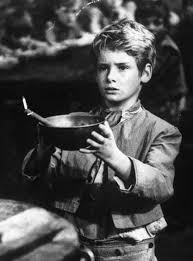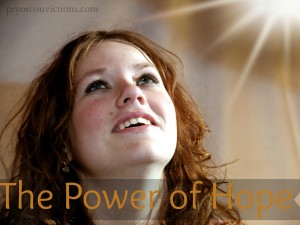“And now, Lord, what do I wait for? My hope is in You.” ~Psalm 39:7
If you were to look at the faces of the children living in the dark, unhealthy, and oppressive building, you might see vacant stares. You would not hear any laughter or see these children playing tag or hopscotch or blind man’s buff with each other. These children worked hard all day, lived in conditions that were less than sanitary, and rarely saw sunlight. These children lived in the workhouse.
The workhouses of England in the 18th through 20th centuries were often run by a master and mistress who abused their power and authority and often had little to no compassion for the inmates over which they had charge.  (Think Oliver Twist: “Please, sir! I want some more!”) The workhouses were intended to be the safety net for the ablebodied poor who could no longer provide for themselves or their families with adequate food and housing. In return for being provided with such at the workhouse, they would work at various tasks that were often difficult and tedious. Going to the workhouse was a last resort and one that many felt they would rather die than have to utilize. Upon admission to a workhouse, families were separated: husbands and wives went to separate quarters and children usually 7 and older were separated from their parents. These children were left to fend for themselves at a very young age often without the comfort of a parent or sibling. Conditions in the workhouses for children were often appalling. A report published in 1838 noted, “…the pale and unhealthy appearance of a number of children in the workhouse, in a room called the Infant Nursery. These children appear to be from two to three years of age; they are 23 in number; they all sleep in one room, and they seldom or never go out of this room, either for air or for exercise.” It was in just such a place that a little girl named Jane lived.
(Think Oliver Twist: “Please, sir! I want some more!”) The workhouses were intended to be the safety net for the ablebodied poor who could no longer provide for themselves or their families with adequate food and housing. In return for being provided with such at the workhouse, they would work at various tasks that were often difficult and tedious. Going to the workhouse was a last resort and one that many felt they would rather die than have to utilize. Upon admission to a workhouse, families were separated: husbands and wives went to separate quarters and children usually 7 and older were separated from their parents. These children were left to fend for themselves at a very young age often without the comfort of a parent or sibling. Conditions in the workhouses for children were often appalling. A report published in 1838 noted, “…the pale and unhealthy appearance of a number of children in the workhouse, in a room called the Infant Nursery. These children appear to be from two to three years of age; they are 23 in number; they all sleep in one room, and they seldom or never go out of this room, either for air or for exercise.” It was in just such a place that a little girl named Jane lived.
However, Jane was not like the other workhouse children. She had eyes that sparkled and a lovely smile. She skipped, sang to herself as she worked, and even laughed out loud. Jane was different from all the other silent, downcast children because Jane treasured up a secret in her heart. Jane had heard it whispered about that she had a father that lived outside of the workhouse and he was not just any father! She had heard he was a wealthy man, a distinguished gentleman and a member of something called Parliament. Jane spent day after day imagining what her father must look like and how wonderful it would be when he came to take her home. She imagined him wearing striped pants and an elegant black overcoat with a shining top hat sitting on his head and a silver cane in his gloved hand. He would be kind and smile at her with love shining in his eyes. Oh! What a marvelous day it was going to be when her father came to get her! She could hardly wait!
One day a wealthy, impeccably-dressed gentleman visited the workhouse to address all of the children about a treat he and his wife wanted to give them: a visit to the seashore. The man noticed as he talked that all of the children looked down at the floor or stared at the walls listlessly, except for one little girl. She listened to him with rapt attention and he directed all of his comments to her excited little face. When his speech was over, Jane ran up to him and threw her arms around his waist. Tears of happiness squeezed from the corners of her eyes as she whispered over and over, “Daddy, I love you! I love you so much! I knew you’d come for me, Daddy!” The kind man felt sorry for her as he awkwardly disengaged her arms and turned her over to the mistress of the workhouse. The mistress was enraged at Jane for her behavior and dragged Jane into a room where she was left alone for two hours while the mistress went and told her husband what had happened.
Jane sat in the room, waiting. Any moment her father would come and take her home. Surely it would be soon! At long last she heard the door open behind her, and she swung around expectantly with a huge smile on her face only to see the master of the workhouse enter with a huge frown on his. Jane was severely beaten with a whip and barely survived. Her broken, bloodied body was carried up to the quarters where she slept. A nurse, who was not without compassion, tended little Jane’s wounds and worked diligently to repair her body. Her spirit, on the other hand, was not so easily mended. Jane stopped speaking. She no longer smiled or sang. She lost all interest in education and regressed in every area of life. Jane was 8 years old, and she had lost all hope.
Hope is powerful. Humans can endure virtually anything as long as there is hope. We often refer to it as being able to see the light at the end of the tunnel. But when all hope is gone, despair takes its place.
Hope may be defined as “an expectation of future good.” Our hope is the expectation of the coming of our Lord Jesus to take us home to be with the Father eternally. It is promised by God to those who are in Christ and it is our light at the end of the tunnel that cannot and will not be extinguished. It is a hope that no one can ever take from us. Consider these wonderful assurances from scripture: “In hope of eternal life which God, who cannot lie, promised before time began.” (Titus 1:2 NKJV) “Looking for the blessed hope and glorious appearing of our great God and Savior Jesus Christ.” (Titus 2:13) “This hope we have as an anchor of the soul, both sure and steadfast…” (Hebrews 6:19) “Blessed be the God and Father of our Lord Jesus Christ who according to His abundant mercy has begotten us again to a living hope through the resurrection of Jesus Christ from the dead, to an inheritance incorruptible and undefiled and that does not fade away, reserved in heaven for you.” (I Peter 1:3-4)
Jennifer Worth writes about Jane in her memoirs as a midwife in London’s east end in the 1950’s. Jane was a real girl whose father was a wealthy member of Parliament, but whose mother was a servant in his household that was cast out when she became pregnant by him. Jane waited for and hoped for a father that would love her and would come to take her home, but it never happened. Jane had been able to endure an unspeakable life in the workhouse as long as she had hope, but when that was literally beaten out of her, it was almost the ruin of her. It took her well into her adult life to overcome the devastation of that lost hope in her childhood. Her hope was sadly misplaced in an imperfect earthly father who did not love or care about his little daughter. How blessed we are as children of God that we have a Father who does love us and cares about us. He is kind and tenderhearted, mindful of our struggles here on this earth and sympathetic to any sorrow that is in our hearts. He is a Father who has promised us a home with Him. “Let not your heart be troubled: you believe in God, believe also in Me. In My Father’s house are many mansions; if it were not so, I would have told you. I go to prepare a place for you. And if I go and prepare a place for you, I will come again and receive you to Myself; that where I am, there you may be also.” (John 14:1-3) Our Father is coming to take us home to heaven with Him. We can endure this life with all of its sorrow and pain because of these powerful promises of God. We have hope!


The workhouse conditions were deplorable and very sad. Jennifer Worth’s books are truly eye-opening in many respects, but her particular story about Jane really stood out to me as I thought about how blessed we are to have a heavenly Father that always keeps His promises. Thank you for your insightful comments, Kashif. I’m glad you enjoyed the post.
I really ejnoyed both of these books, though not without caveats. Like you mentioned, several parts were difficult to read, especially as a mother of young children. (For me, these would not have been good books to read while pregnant, as I tend to have nightmares if I read about horrific situations dealing with children; at the same time, it is incredibly sad that this is/was reality for many, while I can simply mention that reading it is hard.) I think one thing that really stood out to me about the workhouse system and dock workers was how trapped many people were, and how impossible it was for them to escape their horrible circumstances something very foreign to our current American experience. I also concur with your concluding thoughts, and believe this type of book can be helpfully eye-opening and paradigm-shifting, especially to those of us born with a degree of privilege (not talking about wealth, but about a type of life that is not in cycles of poverty and social injustice). I do wish Jennifer Worth had written more about her experiences and were still around to respond to questions her books have made us think about.Keren recently posted..
Thank you, Debbie! Yes, if only everyone could know the blessing of a perfect Heavenly Father and the hope He offers.
Very moving and powerful! Great illustration. I’m so thankful for a Heavenly Father that is nothing like a human father. So many need to know this. Bless you!